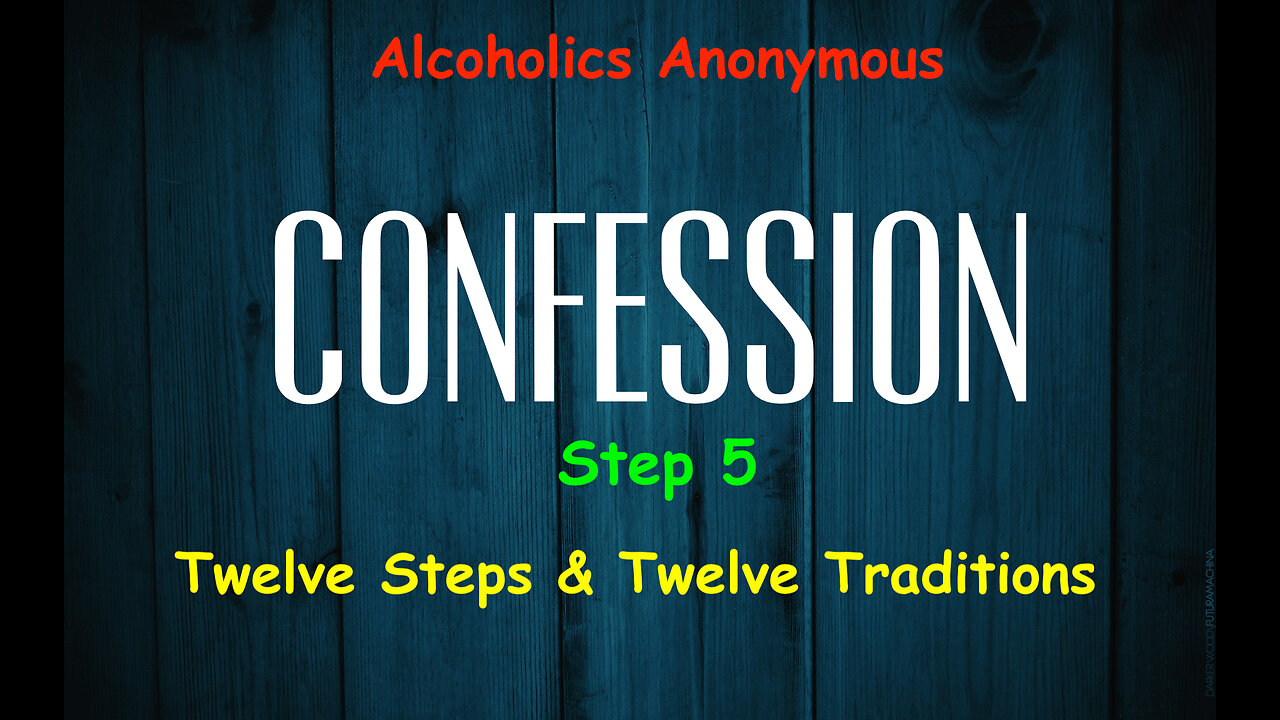Premium Only Content

Twelve Steps & Twelve Traditions - Step 5 - Alcoholics Anonymous - Read Along
Chapter 5 (Step 5) - Twelve Steps & Twelve Traditions - Alcoholics Anonymous - 12 & 12 Read Along
If you or someone you care about is suffering from addiction, there is help available.
Alcoholics Anonymous has been successful in saving millions of lives and families.
Local meetings can be found online.
Reach out if you would like assistance.
Spiritual principles helping to live your best life without alcohol and drugs.
Recovery from unhealthy habits and creating solutions for a long happy and useful life.
Alcoholism doesn't have to be a death sentence.
Addiction can be fixed.
Step Five
“Admitted to God, to ourselves, and to an- other human being the exact nature of our wrongs.”
ALL OF A.A.'s Twelve Steps ask us to go contrary to our natural desires . . . they all deflate our egos. When it comes to ego deflation, few Steps are harder to take than Five. But scarcely any Step is more necessary to longtime sobriety and peace of mind than this one.
A.A. experience has taught us we cannot live alone with our pressing problems and the character defects which cause or aggravate them. If we have swept the searchlight of Step Four back and forth over our careers, and it has revealed in stark relief those experiences we'd rather not remember, if we have come to know how wrong thinking and action have hurt us and others, then the need to quit living by ourselves with those tormenting ghosts of yesterday gets more urgent than ever. We have to talk to somebody about them.
So intense, though, is our fear and reluctance to do this, that many A.A.'s at first try to bypass Step Five.
Certain distressing or humiliating memories, we tell ourselves, ought not be shared with anyone. These will remain our secret. Not a soul must ever know. We hope they'll go to the grave with us.
Yet if A.A.'s experience means anything at all, this is not only unwise, but is actually a perilous resolve. Few muddled attitudes have caused us more trouble than holding back on Step Five. Some people are unable to stay sober at all; others will relapse periodically until they really clean house. They will tell how they tried to carry the load alone; how much they suffered of irritability, anxiety, remorse, and depression; and how, unconsciously seeking relief, they would sometimes accuse even their best friends of the very character defects they themselves were trying to conceal. They always discovered that relief never came by confessing the sins of other people. Everybody had to confess his own.
This practice of admitting one's defects to another per son is, of course, very ancient. It has been validated in every century, and it characterizes the lives of all spiritually centered and truly religious people. But today religion is by no means the sole advocate of this saving principle. Psychiatrists and psychologists point out the deep need every human being has for practical insight and knowledge of his own personality flaws and for a discussion of them with an understanding and trustworthy person. So far as alcoholics are concerned, A.A. would go even further. Most of us would declare that without a fearless admission of our defects to another human being we could not stay sober.
What are we likely to receive from Step Five? For one thing, we shall get rid of that terrible sense of isolation we've always had. Almost without exception, alcoholics are tortured by loneliness. Even before our drinking got bad and people began to cut us off, nearly all of us suffered the feeling that we didn't quite belong. Either we were shy, and dared not draw near others, or we were apt to be noisy good fellows craving attention and companionship, but never getting it—at least to our way of thinking. There was always that mysterious barrier we could neither surmount nor understand. It was as if we were actors on a stage, suddenly realizing that we did not know a single line of our parts. That's one reason we loved alcohol too well. It did let us act extemporaneously. But even Bacchus boomeranged on us; we were finally struck down and left in terrified loneliness.
Provided you hold back nothing, your sense of relief will mount from minute to minute. The dammed-up emotions of years break out of their confinement, and miraculously vanish as soon as they are exposed. As the pain subsides, a healing tranquility takes its place. And when humility and serenity are so combined, something else of great moment is apt to occur. Many an A.A., once agnostic or atheistic, tells us that it was during this stage of Step Five that he first actually felt the presence of God. And even those who had faith already of- ten become conscious of God as they never were before.
This feeling of being at one with God and man, this emerging from isolation through the open and honest sharing of our terrible burden of guilt, brings us to a resting place where we may prepare ourselves for the following Steps toward a full and meaningful sobriety.
-
 1:22:12
1:22:12
MattMorseTV
4 hours ago $0.53 earned🔴It’s MUCH WORSE than WE THOUGHT. 🔴
121K163 -

Meisters of Madness
7 hours agoOmega Gaiden - Part 4
16.6K -
 2:51:18
2:51:18
Barry Cunningham
7 hours agoBREAKING NEWS: NATIONAL GUARD ATTACK PRESS CONFERENCE AND LIVE UPDATES!
69.3K46 -
 LIVE
LIVE
SilverFox
3 hours ago🔴LIVE - ARC AT NIGHT! COME THRU!
205 watching -
 2:46:09
2:46:09
Joker Effect
3 hours agoCLAVICULAR - What the hell is "Looks Maxing"? Asmond Gold is a Demon. KaceyTron. Steve Will do it.
26K2 -
 LIVE
LIVE
SlingerGames
2 hours agoLIVE - Wumble Wednesday - BIRTHDAY STREAM!
61 watching -
 LIVE
LIVE
StevieTLIVE
3 hours agoWarzone Win Streaking BIG Challenges MASSIVE Hype NO Losses LOCK IN
21 watching -
 5:33:40
5:33:40
FrizzleMcDizzle
5 hours agoThis game is scary AF - RESIDENT EVIL 7
3.89K -
 1:03:47
1:03:47
TheCrucible
7 hours agoThe Extravaganza! EP: 66 (11/25/25)
93.7K14 -

xxTOWERDOGxx
6 hours ago🦃Wobble Wobble, while you Gobble Gobble 🦃🟢Premium Creator🟢🪒No Shave November🪒
2K